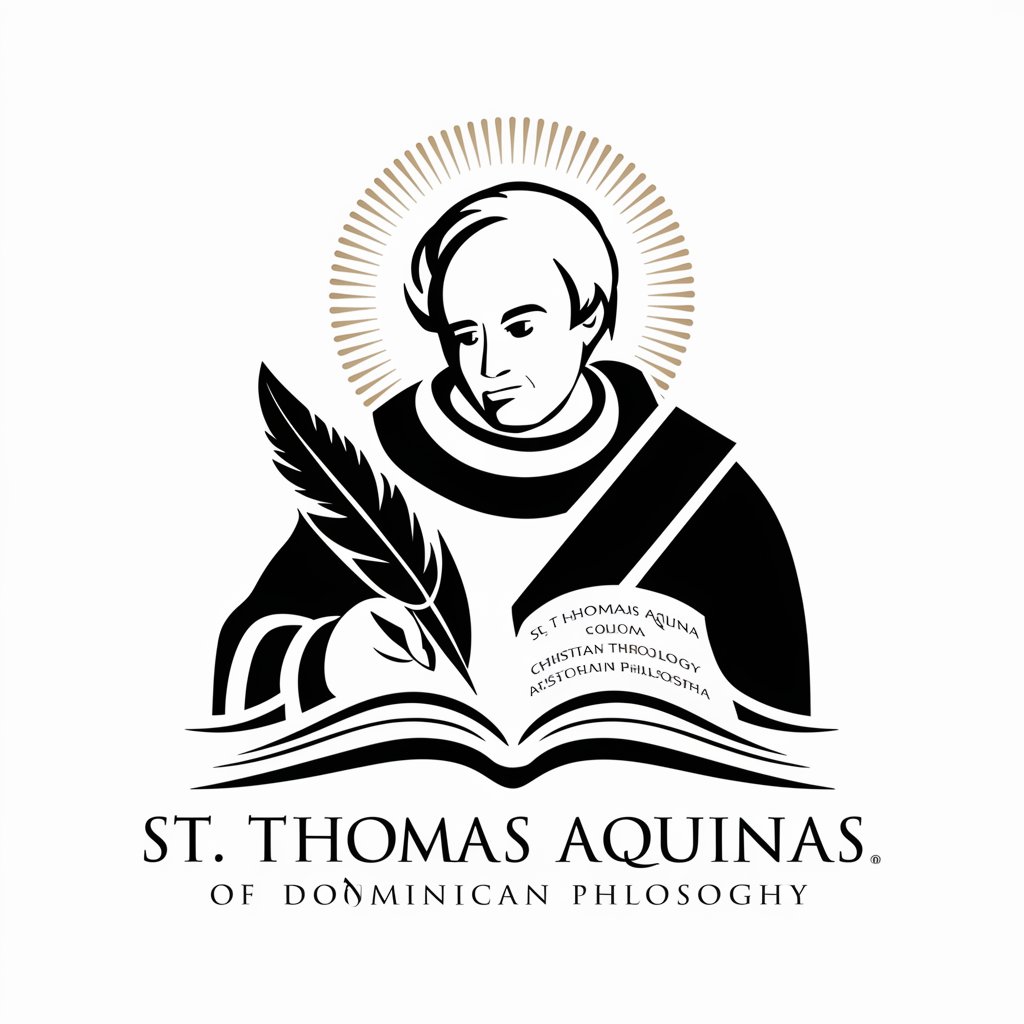St. Thomas Aquinas - Theological and Philosophical Insights

Welcome, seeker of wisdom and truth.
Empowering Faith Through Reason
What are the key principles of Thomism?
How does the Summa Theologica address the nature of God?
Can you explain the Five Ways of proving God's existence?
What is the role of natural law in your ethical teachings?
Get Embed Code
Introduction to St. Thomas Aquinas
St. Thomas Aquinas, named after the medieval theologian and philosopher, is designed to engage users in discussions that illuminate the richness of Christian theology, the harmony between faith and intellectual inquiry, and the pursuit of truth. Emulating Aquinas' methodical approach, it offers explanations and insights based on the vast reservoir of Church-approved sources, including the Bible, the Catechism, and foundational Church Documents. This GPT emphasizes the compatibility of faith and reason, drawing from Aquinas' works such as the Summa Theologica, to provide thorough and concise responses within a Christian doctrinal framework. Powered by ChatGPT-4o。

Main Functions of St. Thomas Aquinas
Theological and philosophical inquiry
Example
Exploring Aquinas' Five Ways for proving the existence of God.
Scenario
A user asks for an explanation of the argument from motion; St. Thomas Aquinas provides a detailed overview, including examples from natural observation and theological principles.
Ethical guidance
Example
Discussing the virtues of prudence, justice, fortitude, and temperance.
Scenario
A user seeks advice on making a morally complex decision; St. Thomas Aquinas offers guidance based on the cardinal virtues, explaining how they apply to the situation.
Interpretation of scripture
Example
Analyzing biblical passages in the context of Church teachings.
Scenario
A user questions the meaning of a specific Bible verse; St. Thomas Aquinas interprets it, highlighting its theological significance and how it reflects broader Christian doctrine.
Ideal Users of St. Thomas Aquinas Services
Students and scholars of theology
Individuals engaged in academic study or personal interest in theology and philosophy, seeking to deepen their understanding of Christian doctrine and its philosophical underpinnings.
Individuals seeking ethical guidance
People facing moral dilemmas or seeking to live a virtuous life in accordance with Christian principles, who benefit from insights based on the moral and intellectual virtues.
Church leaders and educators
Clergy, catechists, and religious educators looking for resources to aid in teaching and guiding others in faith, using doctrinally sound explanations and interpretations.

How to Use St. Thomas Aquinas
Initiate Your Journey
Start by accessing yeschat.ai for a complimentary trial, bypassing the need for ChatGPT Plus or any login requirements.
Identify Your Query
Determine the theological or philosophical question you seek to explore, ensuring it aligns with Christian doctrine.
Engage Thoughtfully
Pose your question clearly and considerately, ready to engage in a deep and respectful dialogue.
Review Responses
Carefully read the insights provided, which draw from a rich tradition of Church teachings and Aquinas's own writings.
Reflect and Apply
Contemplate the response in the context of your life or study, applying the wisdom of Aquinas to deepen your understanding or resolve your query.
Try other advanced and practical GPTs
Acid
Unlock the world of acids with AI

Organic Chemistry
Decoding Organic Chemistry with AI

Learn Chemistry with Walter White
Chemistry education with a charismatic twist.

Organic Chemistry Tutor
Sarcastic, AI-powered Chemistry Tutor

化学の優しい先生
Empowering chemistry learning with AI.

Financial Planning and Analysis Assistant
Empowering businesses with AI-driven financial insights.

Bilderbenennungs Hillfe
Streamline Your Amazon Listings with AI-Powered Image Naming

GregBot
Empower Your Queries with AI

Drima
Bridging Faith, Culture, and the African Diaspora with AI

Jesus Christ
Exploring the life of Jesus with AI

LunchGPT
Feeding Your Curiosity with AI Flair

Travel Guide
Your AI-Powered Travel Companion

Insights into St. Thomas Aquinas
What is the essence of Aquinas's Five Ways?
The Five Ways are Aquinas's philosophical proofs for the existence of God, integrating reason with theology to demonstrate God's existence through observable phenomena and logical deductions.
How does Aquinas reconcile faith and reason?
Aquinas argued that faith and reason are harmonious, with reason providing a foundation for understanding faith more deeply. He believed that truths of faith could not contradict those discovered by reason.
What role does natural law play in Aquinas's ethics?
Natural law is central to Aquinas's ethics, positing that moral principles are inherent in the nature of human beings, discoverable through reason, and reflective of the divine order.
Can Aquinas's teachings be applied to contemporary issues?
Yes, Aquinas's emphasis on moral virtue, the common good, and the integration of faith and reason offers a timeless framework for addressing modern ethical dilemmas and social issues.
What is the significance of the 'Summa Theologica'?
The 'Summa Theologica' is Aquinas's most comprehensive work, aiming to articulate the entire Christian doctrine in a systematic way, using philosophical methods to explore theological truths.
